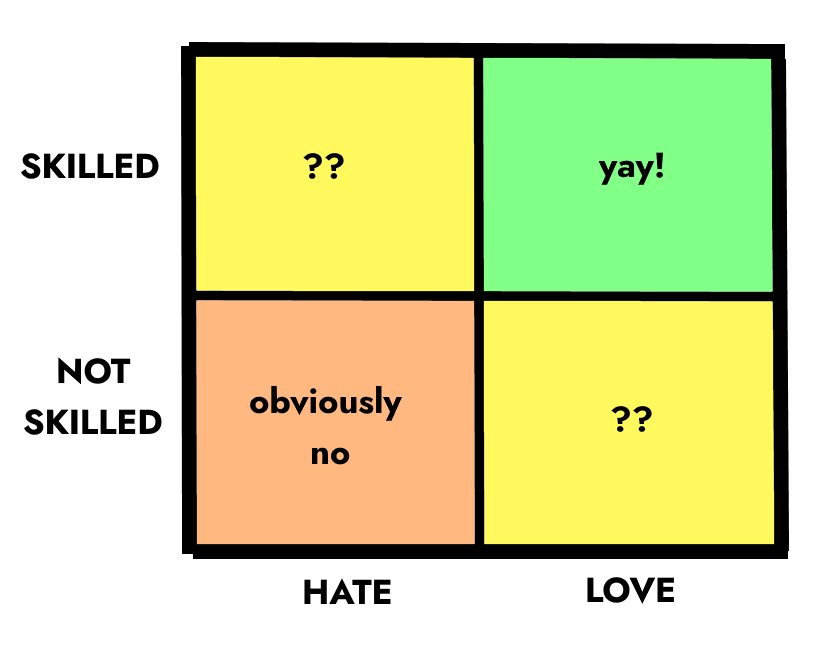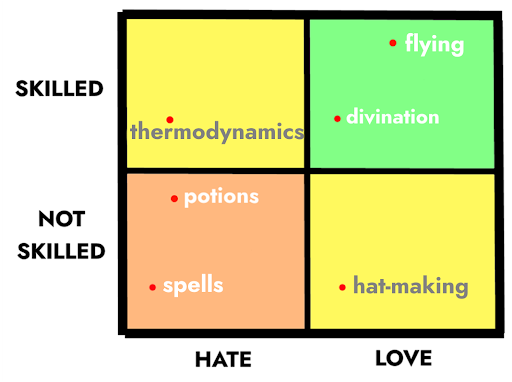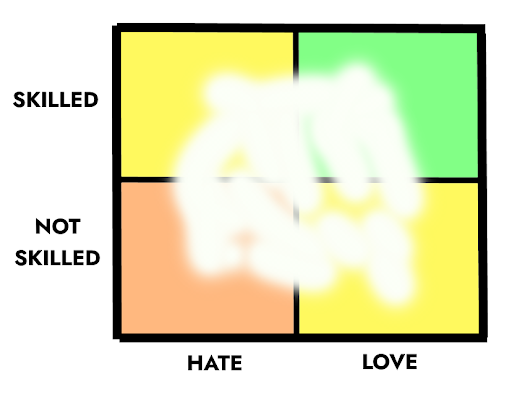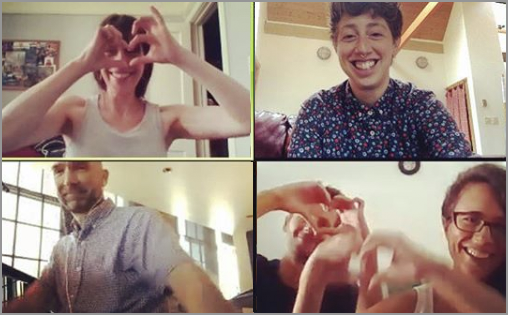Being skilled is a curse.
I don’t mean to sound conceited. (How could I be? One of my very best features is my world-beating humility.) It’s just that…when you can do something, it’s easy to feel like you should.
Would I be a respected scholar if I’d stuck with academia? Or a well-known comic if I’d committed more to it? Probably not. But regardless of how realistic these thoughts are, it can be painful to imagine what I might have achieved if I’d chosen to allocate my time differently.
We humans—and perhaps we multipods in particular—struggle to aggregate information about our skills and desires.
Paradoxically, it’s fear of unrealised potential which has often driven me from one option to another: Sure, I could stick with this… but then I’d never get around to THAT! Unfortunately, this isn’t a sustainable system. I end up reacting to whichever gut pull is strongest at any given time. Assessing what I’m good at is exhausting enough. What about figuring out what I actually like?!
The old adage “follow your passion” only adds to my confusion. What if I suck at my passion? Or I don’t quite know what it is? Or *gasp* I have multiple passions?!
In short, we humans—and perhaps we multipods in particular—struggle to aggregate information about our skills and desires. The (frankly absurd) level of difficulty we face when trying to make objective observations about our lives can lead to paralysis, confusion, overwhelm and difficulty making choices.
Luckily, we have charts and graphs! One way to get some perspective on this dilemma is to plot the ways we spend our time on a chart, placing the things we love further to the right, and the things we’re better at higher up. This places each activity into one of four quadrants:

In theory, this chart makes decisions very simple. Love something you’re good at? Do it more! Hate something you suck at? Avoid it!
The two yellow quadrants—where you either love something or are skilled at it—are a bit more complicated, but there is still a benefit to comparing the position of each option against the others. For example, I did some thinking about my favourite subjects from my school days in my extremely normal and definitely real British school:

As you can see, divination came naturally to me–and who doesn’t love predicting the future? I always aced a thermodynamics exam and was still out on the green in time for flying practice, but the actual calculations felt tedious to me. And, while I enjoyed sewing a big floppy hat, I was utterly terrible at it and the blot on my exam record haunts me to this day.
Of course, a love-skill plot doesn’t have to compare academic options. I could plot the five or six various activities which make up my current career. Or, I could use the chart to decide which hobby to prioritise in my free time.
There’s also no right way to interpret the data. Depending on my goals, it might lead me to:
- Completely avoid the options in the bottom left
- Focus solely on those in the top right
- Prioritise the things I love, regardless of skill
- Prioritise the things I’m good at, regardless of enjoyment
- Aim to love the things I don’t enjoy as much, but am good at
Or…you get the idea. Presenting our options in a novel fashion can lead us to new conclusions. But, what if you can’t even tell whether you’re enjoying something or not? Or if you’re good at it?! Those might sound like silly questions, but…
Knowing ourselves is harder than we think
For starters, there’s a famous result in psychology called the Dunning-Kruger effect, which says that we humans are often pretty bad at accurately judging our own skills and knowledge. It makes sense when you think about it: the ability to accurately assess a certain skill often develops after mastering the skill.
This effect makes me inherently mistrust my self-judgement… before I even address the huge swings of self-doubt—or, more rarely, over-confidence—that plague me from time to time. Knowing if we’re good at something is actually fairly difficult.
You’d think it would at least be easy to tell if we like something or not, though. But, deep into an activity or career, I’ve often been struck by the sudden realisation that I’m not enjoying myself. I expect it’s a universal experience to stick to an activity or habit or tv program for years before realising we actually just don’t like it as much as we thought. Our routines become habits, and we can go for long swaths of time without really assessing how we feel about them.
Even worse, our brains treacherously enjoy simply being good at something. We can fool ourselves into thinking we like an activity when really we just enjoy the feeling of accomplishment.
So, any real-world attempt to plot these charts of ‘how much we like something’ versus ‘how good we are at it’ is likely to be cloudy at best:

How do we really tell whether we love an activity? Or whether we’re any good at it? Let’s peer beneath that mysterious cloud of unknowing.
What is beneath enjoyment?
Taking time to ask yourself Do I really like this? can lead to surprising results.
If asked, I might say I like watching television. But if I actually paid attention while I was doing it, the experience might go something like:
- Joylessly scroll through options on a streaming platform
- Half-heartedly pick a program
- Get distracted while watching
- Scroll aimlessly on my phone while vaguely paying attention
Similarly, I might say I don’t enjoy working, if someone asked. But in reality I often get lost in it for hours and feel happy afterwards. My simple intuition about what I think I enjoy can be misleading. To figure out what’s happening for any given activity, it helps to go a layer deeper and consciously ask “what do I like or dislike about this?” Pick an activity, and make a list of all the possible facets of it that you like and dislike, and how strong they are.
For example, rating a job I used to have, I might say:
- I like the acclaim (+1)
- I like the feeling of flow that I get sometimes (+10)
- I dislike how long it usually takes to get into that flow (-3)
- I dislike the feeling of ‘having to do this’ (-3)
- I like feeling that I’m good at it (+3)
- I like that I get paid for it (+5)
- I dislike the AMOUNT I have to do (-3)
It would be tempting to conclude that ending up on +10 means I like it, but these tallies are always in flux and giving them a final number makes them seem more objectively true than they are.
In reality, any answer to “do I like this?” is a fiction—there isn’t one internal score that goes from ‘love’ to ‘hate’, just a messy average that fluctuates with time and mood. (This helps explain why we have those moments of realisation that we don’t like something after all: the internal calculation may have changed without our consciously figuring it out.) As a result, making these lists won’t reveal an accurate score for liking something, but it’s not supposed to. The idea is to sort activities in relation to one another, i.e. put them into an approximate left/right order on my plot, and then use that to make decisions about where to focus my time and attention.
The real truth about “how good you are”
Our emotions may be messy and clouded, but surely our level of skill at a certain task is more clear cut?
In many cases, our skill level is obvious: we don’t need to be told that we’re good at basketball, mathematics, accounting or parkour. The results (or, in my case, the dire injuries) speak for themselves. But when it comes to anything subjective—art, poetry, comedy, singing or even the use of language—it can be difficult to assess our true level.
Over-confidence, under-confidence, self-doubt and comparison all conspire to confuse the picture. Awareness of the Dunning-Kruger effect—where beginners tend to overestimate their ability and experts underestimate it—help to compensate for some of the confusion. A more reliable path to clear-sightedness lies in seeking a range of opinions.
After all, there’s no such thing as The Real Truth About How Good You Are At Poetry. But, while you can’t be objectively sure how good your work is, you can discover how popular it is—and then decide for yourself how much that matters to you. Statistics like 90% of all humans think my poems suck or Everyone who’s read them genuinely likes them give you some amount of information about your work. That information can help you make a judgement about your ability.
You don’t need to develop a universal scale for how skilled you are. Just sorting your options from “relatively terrible at” to “relatively great at” will help you determine where different activities fall on the graph.
The nagging missing factors
It’s almost certain that, after evaluating your activities on enjoyment and skill, you’ll have a nagging feeling that haven’t arrived at the whole story. That’s because enjoyment and skill are only two factors of many.
It’s common to value a task without being good at it OR liking it. Many daily tasks fall into this category for me. I don’t like laundry—nor am I especially talented at it!—but I value it, so I dedicate time that I could be using elsewhere.
Another dimension might be necessity. I don’t enjoy trudging through the desert back to civilisation after being stranded, nor am I good at it, but there are situations (well, one situation) in which it would be absolutely required to do so. Many jobs in our lives are neither fun nor natural to us, but we have to do them for one reason or another.
An incomplete list of extra factors:
- Value
- Necessity
- Social status
- Opportunity cost
- (Im)possibility
It’s not feasible to plot all of your activities on all of these dimensions. (If, like me, you love a spreadsheet, you might have fun rating all of your options on every dimension you can think of and drawing conclusions from the numbers you come up with!) Even without taking a strictly mathematical approach, reflecting on the necessity, value, or status of different tasks is worthwhile. All these factors can help in choosing what to prioritise.
Looking at your skills and passions, are there novel ways you could mix them? Or could you somehow apply your unloved skills to the activities you do want to do?
How to apply your observations
Sometimes, these sorts of reflections lead to obvious conclusions. If you identify unnecessary activities which you hate/are bad at, then you can cut them out to spend more time on the things you love/are good at. What other conclusions can you draw?
Looking at your skills and passions, are there novel ways you could mix them? Or could you somehow apply your unloved skills to the activities you do want to do? For example, I never wanted to be a career comedian, but I do enjoy standing on stage and making people laugh, so I’ve found a way to use these skills to give humorous talks instead. Similarly, Emilie didn’t particularly enjoy her work as a web designer, but she uses those skills frequently to support her other projects.
After all is done, if you’re lucky, you may be left with a choice between multiple good options. In which case, don’t worry. There’s no single right answer. An ideal life doesn’t have to be purely passionate. Sometimes it’s a great choice to do things we don’t like for the skills or experiences…or simply the money. Or, you may still be figuring out which options you prefer. It’s okay to experiment for a while.
We rarely have perfect clarity on what to focus on. But, by digging deep into those things we enjoy and investigating how they overlap with the things we’re good at, we can get a little more clarity on what to do right now.
Your Turn
How do you distinguish what you love from what you’re good at? Do you have a system for making decisions about what to focus on? Share your stories with the community in the comments.

Doing/being/exploring ALL THE THINGS is easier with a community!

Did you know we have a private community of hundreds of multipotentialites from around the world? We support each other, share advice and cheer each other on as we building lives and career around ALL our passions.
Learn more about the Puttyverse and get notified next time we open the doors:


Ah, Neil, you have hit the target on the driving force in my life: how to choose one path? I feel unsettled no matter what I decide to do, often using a scattershot approach. But I do have a feeling I’m not alone. Part of the problem may be a lack of confidence—I’m afraid I won’t succeed and so I leave things unfinished or unrealized to their fullest potential. These days of the pandemic I struggle to commit to one or two or three projects at a time, setting time goals. If this were applied to a love life it would mean I date several people at the same time. Any suggestions about how to improve?
That’s definitely a tough dilemma, Elise. I think it’s always possible to construct “one” path that contains all the elements we require to meet our needs. It sounds like you’re getting tangled up in multiple issues at once – sometimes we can’t make choices about our lives until we’ve worked on our fear of success, fear of completion, fear of failure, fear of making choices, etc. Personally when I detect one of those fears I make it my priority to address it head-on, and then I return to the original decision and it usually looks different afterwards. I hope you manage to untangle yourself and take some steps towards your goals in 2021 – remember even an unfinished journey towards a goal can be valuable (though I hope you make it to some too!)
If I love it, I don’t necessarily have to be good at it. Sometimes the process is more important than the product. Coincidentally though, the more time I spend doing things I love (without expectations or judgment) the better I get at them. ?????
Absolutely! It’s rarely a bad idea to spend time on something we love doing 🙂
Muy point to know what I LOVE IS looking at my library’s books, YouTube subs, newsletters and so on.. that you spend your leisure time on is a good hint about your loves ?
Fantastic point, Ezequiel! I believe this is the theory of ‘revealed preferences’ – that what we choose to spend time on reveals what we value. Of course sometimes it’s a bit more complicated, as I occasionally spend my leisure time on activities which leave me feeling worse afterwards – joyless wasted leisure hours, if you get me. But looking at what I would have preferred to spend that time on is also revealing 🙂
What if what you love is the experience of learning something new and the challenge of overcoming obstacles? Theoretically, one would never become an expert or master at any one thing and “mastery” is supposed to be a big component of satisfaction, right? There are many things that I don’t necessarily like to do but see the value for myself or others. Delivering on that value is hugely rewarding despite the fact that the task itself might be unpleasant and I may not be especially good at performing that particular function. What then?
Exactly, JT, it can all get very complicated when our desires are seemingly in conflict. I think we have two options. First, we can rationally compare all of these different factors: “I value mastery over novelty so I’m going to stick this out even though I ALSO feel drawn to start something new” – or the converse, depending on which we value most at this point in time.
Similarly, “I’m not good at this but I can see the value it’s bringing to others… and I can learn” is a perfectly good reason to continue with something. And it’s a perfectly good reason to stop, too, if we decide our enjoyment matters more right now.
As I see it, the point isn’t to construct a foolproof computation that always gives us the “right” answer to what to do, it’s to build tools which help us in the lifelong process of evaluating what we’re doing now and what we might do next. I think your thoughts are very useful input to that process!
Of course, to many people this is just overthinking it, which is why there’s also Option Two, which is “try not to worry about it all too much and just do whatever feels most right in the moment”. (And yes, to my fellow overthinkers, this intuition also plays a part in the rational analysis option.)
Hahaha… I postponed reading this for a few days and when I decided to read it … I aready had all my various notes with ideas and projects in the table and was trying to sort them out ? …
Dear Neil Thank you … for your humor and encouragement. Sorting skills and passions helps me get some clarity. I have a strange believe that somewhere behind the mess there is that one thread that brings everything nicely together… and I keep an eye open for it. But as you say, there is no one right answer and that is the beauty of multipotentiality.
Cheers and best Wishes,???
Well said ! As much as I desperately wish to Know What I Love To Do, I don’t either, just as all the Peeps on your post have said.
I do seem to have a bit of an historical outlook in general – I know what I liked doing upon later reflection even if I did not know it at the time. Pattern-wise, things I love tend to involve people and I just know that seeing the pyramids in Egypt would make me think of the sweat and toil employed to move those blocks.
Lastly, I will say that I am now disappointed in American education. I NEVER had the chance to make a hat, fly, nor divine a single thing. However, I am ok not throwing my body off of buildings, railings, or ledges and calling it “parkour” so it sounds like I did not hurt myself on purpose.
Great thought piece here that will sit with me for a bit and you have already given me a bit of solace as I face my own to dos.
I agree with finding ways to combine your skills or interests. Also not putting so much pressure on yourself. you don’t have to do every skill or activity everyday, mix things up if you can and find ways where they can be used together even. Thank you!
Love this just as much reading it for the second time! I so relate to “Sure, I could stick with this… but then I’d never get around to THAT!”, haha. The graphs are hilarious and feel like such an empowering way to look at decision-making around how to spend my time. Thank you 😀